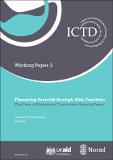| dc.contributor.author | Flores-Macías, Gustavo A. | |
| dc.date.accessioned | 2013-02-04T16:17:43Z | |
| dc.date.available | 2013-02-04T16:17:43Z | |
| dc.date.issued | 2012-07 | |
| dc.identifier.citation | Flores-Macías, G. A. (2012) Financing Security through Elite Taxation: The Case of Colombia’s ‘Democratic Security Taxes’, ICTD working paper 3, Brighton: IDS | en_GB |
| dc.identifier.isbn | 9781781180877 | |
| dc.identifier.uri | https://opendocs.ids.ac.uk/opendocs/handle/20.500.12413/2312 | |
| dc.description.abstract | Governments across the developing world in general, and Latin America in particular, tend to have difficulty in raising taxes from elites. In 2002, however, the Colombian government introduced the first of a series of wealth taxes aimed solely at rich individuals and companies with large liquid assets. Revenue from these taxes, which amounted to about 1 per cent of GDP, was earmarked for security. Drawing on elite interviews, surveys, government documents, and media sources, I examine why these taxes were introduced, and explore three different explanations: the combination of fiscal and security crises; elite solidarity; and perceptions that the government was making Colombia a safer place. It was the interaction of all three factors that led to this unusual outcome. | en_GB |
| dc.description.sponsorship | DfID | en_GB |
| dc.language.iso | en | en_GB |
| dc.publisher | IDS | en_GB |
| dc.relation.ispartofseries | ICTD working papers;3 | |
| dc.rights.uri | http://www.ids.ac.uk/files/dmfile/IDSOpenDocsStandardTermsOfUse.pdf | en_GB |
| dc.subject | Economic Development | en_GB |
| dc.subject | Finance | en_GB |
| dc.title | Financing Security through Elite Taxation: The Case of Colombia’s ‘Democratic Security Taxes’ | en_GB |
| dc.type | Series paper (IDS) | en_GB |
| dc.identifier.externaluri | http://www.ictd.ac/en/publications/financing-security-through-elite-taxation-case-colombia%E2%80%99s-%E2%80%98democratic-security-taxes' | en_GB |

